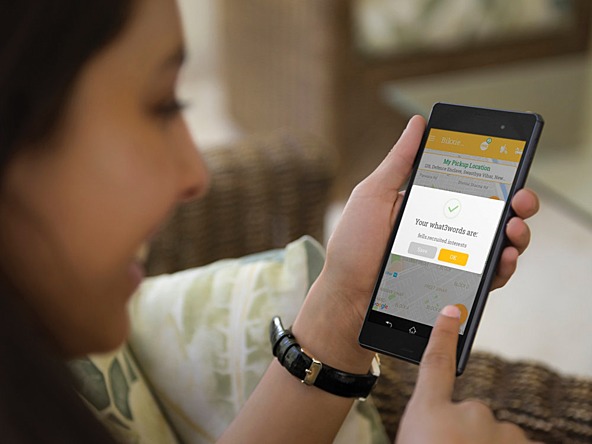FEATURE20 November 2018
Three little words
x Sponsored content on Research Live and in Impact magazine is editorially independent.
Find out more about advertising and sponsorship.
FEATURE20 November 2018
x Sponsored content on Research Live and in Impact magazine is editorially independent.
Find out more about advertising and sponsorship.
One start-up is rethinking the way that addresses work, with data potentially simplifying navigation in hard-to-reach, remote parts of the world. By Katie McQuater

Geo-location platform what3words is on a mission to change the world. Literally. The company wants to rethink an infrastructure so ingrained that we barely stop to question it any more – addressing.
Street addresses are a relatively recent invention, emerging across Europe in the 18th century. They are not universal, however – and, in many parts of the developing world, a lack of addresses can deny people a legal identity, participation in democracy and access to public services.
In addition, addresses and GPS can only take us so far: if you’ve ever attempted to find your way to a sprawling festival site using sat nav, typed in an address only to find there are 34 Victoria Roads in London, or tried to locate the correct entrance to a large office complex, you’ve probably experienced the frustration uniquely associated with navigational systems’ limitations.
According to a OnePoll study commissioned by what3words, only 30% of street addresses in the UK lead directly to the entrance – rising to 70% internationally, for a survey of 3,000 motorists in the UK, the US and Germany. While 80% of drivers use sat nav, 87% of them don’t trust it to get them to the correct destination every time – and 22% said it had led them down the wrong path at least once.
Such inadequacies are, at best, a nuisance for motorists, but they also slow down the logistics sector and can encumber emergency services – 75% of UK survey respondents said deliveries, services and visitors have struggled to find their homes or businesses.
Founded in 2013, what3words wants to solve this problem by using an algorithm that divides the world into a grid system, comprising 57tn 3x3 metre squares, each assigned with a unique three-word phrase – the rationale being that words are more memorable than numbers.
“Lots of people have recognised there’s an issue with addressing, and everyone has solved it in the same way,” says the company’s chief marketing officer, Giles Rhys Jones. “Everybody has added the alphabet to numbers and reduced GPS coordinates to an alphanumeric, but they’re difficult to remember and communicate.”
The system converts GPS coordinates using a database of around 40,000 words and has removed homophones such as ‘hear’ and ‘here’ to avoid mistakes in voice recognition. Similar-sounding locations are also placed thousands of miles apart so there can be no ambiguity – for instance,
table.chair.lamp is in America, while table.chair.damp is in Australia.
The system has obvious affinities with the logistics and auto sectors. Tests conducted by the company highlight its efficacy when used for deliveries – a logistics company tested the approach, versus traditional street addressing, and found that using three-word addresses cut delivery times by 30% over the course of 20 deliveries. This year, what3words has partnered with Mercedes to install the technology in its new A-Class cars, and it’s being used by firms, such as Middle East delivery company Aramex, to improve delivery routes.
In Mongolia, where addressing is scant, people can use the system for everyday tasks such as delivering post, ordering a pizza, or applying for a credit card. Lonely Planet has also added three-word addresses to the latest edition of its Mongolia guidebook, which it believes will help travellers get about as easily as locals in a country that is “notoriously difficult to navigate”, according to destination editor Megan Eaves. “Addresses are scarce, and signs are few and far between. This made it a natural starting point to introduce these three-word references into our content.”
Although the algorithm itself doesn’t change, the company is adding new languages – there are 26 currently – and features to the app, such as being able to save places. It has also developed a sorting system, using character recognition, to understand what a three-word address is, which it then uses to sort mail and packages.
A look at user behaviour on the app also points to the impact an increasingly digital world is having on the way people interact with the physical world around them. For instance, the company noticed that photographers were using three-word addresses on Instagram to tag the remote places around the world where they’d taken a photo – so it developed an app that drops the three-word reference directly onto a photograph once a user has taken a picture.
The photo app is now also being used for civic involvement – people use it to report lost bicycles, water leaks and potholes – and some Airbnb hosts use it to take a photo of their front door and send it to guests when they make a booking.
What3words’ ambition is to become a global standard for addressing, and it’s currently having conversations around country infrastructure and becoming a legal form of address.
“This year, we’d like to get a country [to adopt] the system,” says Rhys Jones. “If you don’t have an address, you’re invisible to the state – you can’t vote, and it’s difficult to get financing, aid and deliveries. There’s a bunch of people in the world who don’t have an address, so – if we can help that – it’s pretty powerful.”
0 Comments